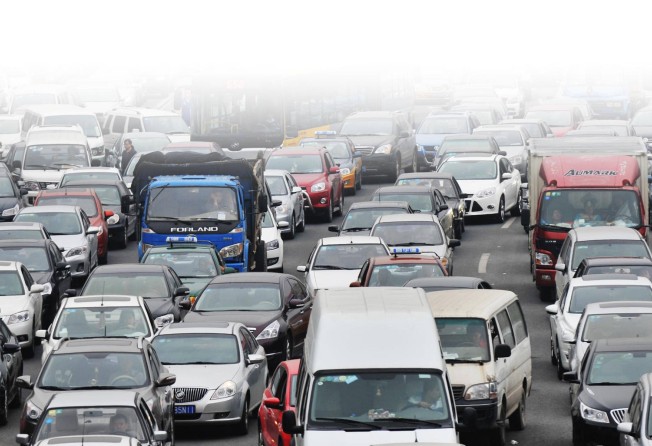Beijing's push to reduce traffic and emissions aims to put the brakes on China's budding car culture
Beijing's push to reduce traffic and emissions aims to put the brakes on China's budding car culture

China is an authoritarian country, but one where rules are constantly broken. Successful investing in the country often involves figuring out whether, in any given situation, the preferences of policymakers or citizens will prevail.
For example, official policy has always been rather tough on villas. China's administrators, many of whom have engineering backgrounds, prefer residential high-rises as the most efficient and energy-saving path to urban development.
But many of China's emerging rich love villas, and developers always manage to deftly manoeuvre around the many disincentives to - if not outright prohibitions against - low-rise residential building development. Ignoring the rules, and betting on companies that specialised in villas, has paid off for stock investors.
Now, however, Xi Jinping is in charge, and he seems rather like a fellow who means business. So for instance, there may still be lots of cadres who like to entertain with nice wine or liquors, and hit the tables at Macau for relaxation, but we can tell, from falling bottom-line sales, who has the upper hand in this arena.
Which brings us to the deepening battle lines over cars.
Shenzhen just became one of the last major cities forced to announce a cap on the number of car licences issued annually. The city had tried to implement other measures to satisfy Beijing's desire for reduced traffic and emissions, such as raising parking fees.
In other words: let car producers earn money selling vehicles, then just make it too expensive for owners to actually drive the cars - a brilliant Keynesian-style solution.
But in the end, Beijing prevailed. A ban was rolled out overnight a couple of weeks ago, leaving dealers no time to pull off a massive sales drive before implementation. Indeed, policemen fanned out to dealerships across the city, shutting down their computers.
This move will disappoint a lot of wannabe car owners: if the cap of 100,000 new car sales per annum is followed, some analysts have calculated that sales will drop by a third in the city.
Frankly, Beijing has good reason to want the number of car drivers to slow dramatically.
Recall that after the global financial crisis, China offered generous subsidies to car buyers in an attempt to stoke domestic demand to make up for falling exports.
The result was that car sales exploded. The country sold 54 million new cars domestically between 2009 and 2012: that is 32 million more than the 22 million cars sold in the four years preceding 2009.
By 2013, there were 120 million passenger vehicles in China, and if sales continue to expand, then China could easily have 500 million passenger cars on the roads by 2020.
Such a rapid growth in car drivers has negative side effects. Urban China has suffered from crisis-level smog in recent years, and cars are part of the problem. Plus the roads weren't ready: traffic congestion has caused miserable gridlock.
Then there are longer-term structural issues. Does China want to be a car-driving society, like the US? If so, the country will use a lot more energy per capita than it does now, a financial and security risk for a country that imports so much of its fuel.
Moreover, car ownership drives the shape of development. Suburban sprawl occurred in the US because car ownership allowed people to move farther from their work places. In the suburbs one can get more space for less money. But then that space needs to be heated in the winter, and air conditioned in the summer. The all-in equation is the key reason why the US uses more energy per capita than any other rich nation.
It has been easy for cities like Singapore and Hong Kong to keep car ownership rates reasonably low; this is because they do not have car manufacturing industries, or much land.
China of course does have a huge automobile manufacturing complex, which brings us back to the question that began this piece.
Will the central government prevail in curbing China's budding car culture? It is a tough battle - many consumers want cars, car factories provide good jobs, and the industry is an important generator of corporate profits and local taxes.
This one is going to be a tough battle, even for someone as determined and self-confident as Xi Jinping.